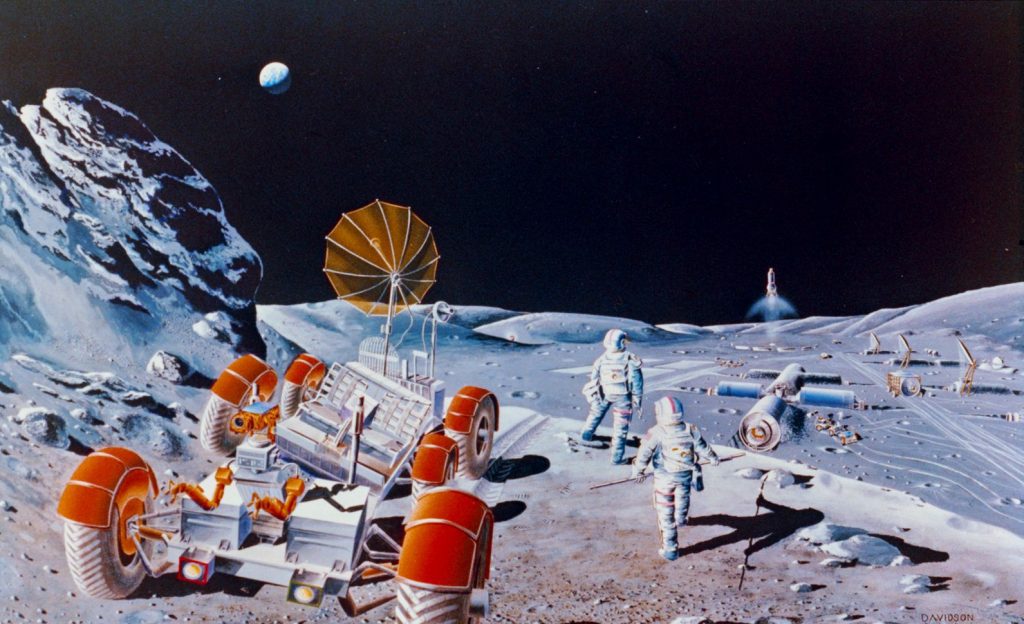Space exploration has captivated humanity for centuries, sparking dreams of discovering the unknown and expanding the limits of our civilization. From the first steps on the Moon in 1969 to the remarkable achievements of robotic missions to Mars, humanity’s journey into space has been marked by significant progress. However, as we stand on the threshold of new technological advancements, the future of space exploration promises to be even more groundbreaking. In this article, we explore the future of space exploration, the challenges ahead, and the exciting possibilities that lie beyond our planet.
A New Era: From Moon to Mars
NASA’s Artemis program, aiming to return humans to the Moon by 2025, is paving the way for humanity’s next big leap into space. The Artemis mission will not only land astronauts on the lunar surface but also establish a sustainable human presence on the Moon. This effort will lay the groundwork for future missions to Mars and beyond, making the Moon a crucial stepping stone in the larger space exploration vision.
One of the key components of the Artemis program is the Lunar Gateway, a space station that will orbit the Moon and serve as a staging point for missions to the lunar surface and deeper into space. This space station will provide astronauts with the necessary resources and logistics to facilitate long-term exploration, marking the beginning of permanent human presence on the Moon. In the coming decades, the Moon is likely to become a hub for scientific research, mining, and possibly tourism.
Following the Moon, the next target for human exploration is Mars. Missions such as SpaceX’s Starship project and NASA’s Mars Sample Return mission will take us closer to sending astronauts to the Red Planet. Mars presents a wealth of challenges, from its thin atmosphere to its hostile environment, but its potential for scientific discovery and resource utilization is immense. The goal is to land astronauts on Mars by the 2030s, with ambitions to establish a permanent base on the planet by the 2040s.
Private Sector Involvement: A New Driving Force
Space exploration is no longer the exclusive domain of government agencies. Private companies, such as SpaceX, Blue Origin, and Virgin Galactic, are playing an increasingly important role in advancing space technology and expanding humanity’s reach beyond Earth. Elon Musk’s SpaceX, with its ambitious plan to make space travel more affordable and accessible, has already revolutionized space transportation with the Falcon 9 and Starship rockets.
Private companies are not just focusing on rocket launches but are developing technologies for space tourism, asteroid mining, and space habitats. Space tourism, once a distant dream, is already becoming a reality, with companies like Blue Origin and Virgin Galactic offering suborbital flights to paying customers. This development has the potential to create a multi-billion-dollar industry and expand humanity’s presence in space in unprecedented ways.
Asteroid mining, in particular, is an area that could revolutionize resource extraction. Companies are exploring the possibility of harvesting precious metals, water, and other valuable resources from asteroids, reducing the strain on Earth’s resources and providing fuel and materials for future space missions. This could create a self-sustaining economy in space, making deep-space exploration more viable in the long term.
Artificial Intelligence and Robotics: Enhancing Exploration
As human missions to distant planets and moons become more complex and prolonged, robotics and artificial intelligence (AI) will play an increasingly critical role. AI-powered systems can assist astronauts with mission-critical tasks, from maintaining spacecraft to analyzing data, while robotic probes will continue to explore the most inhospitable environments where human presence is not yet feasible.
NASA’s Perseverance rover, currently exploring Mars, is a perfect example of how robots can aid in exploration. The rover, equipped with advanced AI systems, is capable of making decisions on its own and autonomously navigating the Martian surface. As AI continues to evolve, future missions will likely see the deployment of highly sophisticated robots capable of conducting more complex tasks, from building habitats on the Moon or Mars to performing advanced scientific experiments in space.
Furthermore, AI-driven simulations and models will assist mission planners in predicting challenges, optimizing resources, and enhancing mission success rates. This will be crucial as we look toward missions lasting years, such as those to Mars, where human and robotic cooperation will be essential for survival.
Space Habitats and Colonization: Living Beyond Earth
One of the most exciting aspects of future space exploration is the potential for colonization. As the Earth faces challenges such as climate change and resource depletion, the idea of creating self-sustaining colonies on other planets has garnered significant attention. Establishing permanent human habitats on the Moon and Mars could not only serve as a backup for humanity but also allow for the expansion of human civilization.
Technological advancements in space habitats will be essential for making long-term space travel feasible. Closed-loop life support systems, which recycle air, water, and waste, will be vital for ensuring astronauts can survive on distant planets. Advances in 3D printing, in particular, hold promise for constructing habitats and other necessary infrastructure using materials available on the Moon or Mars.
Beyond Mars, scientists are also exploring the possibility of building floating colonies on the Moon’s orbit or in space itself. Space habitats could offer new living spaces for research, leisure, and even tourism, and they would also serve as platforms for launching deeper space missions.
The Search for Extraterrestrial Life: Expanding the Horizons of Discovery
One of the most profound objectives of space exploration is the search for extraterrestrial life. In recent years, scientists have discovered thousands of exoplanets in the habitable zone of distant stars, raising the possibility that life exists elsewhere in the universe. Missions such as the James Webb Space Telescope (JWST), set to explore distant exoplanets and study their atmospheres, will provide valuable insights into the potential for life beyond Earth.
In our own solar system, moons such as Europa (orbiting Jupiter) and Enceladus (orbiting Saturn) are believed to have subsurface oceans that may harbor microbial life. Robotic missions to these moons in the coming decades could uncover groundbreaking discoveries about the conditions necessary for life to thrive. The search for life, whether microbial or intelligent, remains one of the most compelling motivations for space exploration.
Challenges Ahead: Sustainability and Ethical Considerations
While the future of space exploration is undoubtedly exciting, it is not without its challenges. The cost of space missions remains a significant barrier, although advances in reusable rocket technology and private sector involvement are helping to reduce expenses. Ensuring the sustainability of space exploration will require international cooperation, responsible resource management, and a commitment to preventing the militarization of space.
Ethical considerations will also play a crucial role as humanity extends its presence beyond Earth. As we explore other planets, we must carefully consider the potential impacts on local environments and ecosystems, especially as we look to colonize new worlds. The preservation of space as a peaceful, collaborative frontier will be vital to ensuring that future exploration benefits all of humanity.
Conclusion: An Era of Unprecedented Discovery
The future of space exploration is poised to be an era of unprecedented discovery and expansion. With advances in technology, private sector involvement, and the drive to explore the unknown, humanity is preparing to push the boundaries of space travel and reach farther than ever before. From returning to the Moon to establishing colonies on Mars and beyond, the possibilities are boundless.
As we look to the stars, the question is no longer whether space exploration will shape our future—it is how far we are willing to go, and what incredible discoveries await us on the next frontier. The future of space exploration is not just about expanding our physical presence in the universe, but about expanding the very idea of what it means to be human in the vast cosmos.

